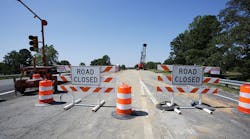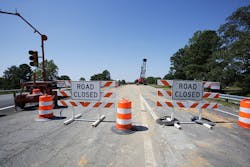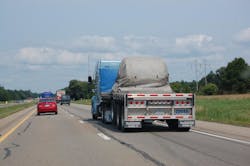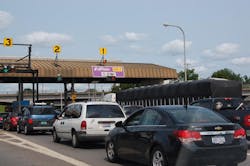U.S. roads ain’t in good shape – and that’s putting it mildly. Yet how to come up with the cash necessary to put them in good working order, much less expand current networks to handle more traffic, remains a Gordian knot still in search of sword.
Let’s look at the condition of U.S. roadways for starters. According to a report released yesterday by The Road Information Program (TRIP), driving on deteriorated urban roads costs the average motorist as much as $1,044 annually by accelerating vehicle deterioration and depreciation, and increasing needed maintenance, fuel consumption and tire wear.TRIP’s report, entitled Bumpy Roads Ahead: America’s Roughest Rides and Strategies to Make our Roads Smoother, found that more than a quarter (28 %) of the nation's major urban roads – which includes interstates, freeways and other “arterial” surface transportation routes – had pavements that were in substandard condition and provided an unacceptably rough ride to motorists, costing the average urban driver $516 annually.
The nationwide annual cost of driving on deteriorated roads totals $109.3 billion, the group said.
“The nation’s rough roads stress nerves and cost billions in unnecessary vehicle replacement, repair and fuel costs,” noted Jill Ingrassia, managing director of government relations and traffic safety advocacy for AAA (formerly the American Automobile Association) in conference call regarding TRIP’s analysis.
The group also found that with vehicle travel growth rates returning to pre-recession levels and large truck travel anticipated to grow significantly, mounting wear and tear on the nation’s urban roads and highways is expected to increase the cost of needed highway repairs. Vehicle travel, which remained largely unchanged from 2008 to 2013, increased by 1.7% from 2013 to 2014 and another 3.9% during the first four months of 2015 compared to the same period in 2014.On top of that, the amount of large commercial truck travel in the U.S. is expected to increase by 72% from 2015 to 2030, noted Janet Kavinoky, Executive Director, Transportation and Infrastructure, U.S. Chamber of Commerce and vice president of the Americans for Transportation Mobility (ATM) Coalition.
“With state and local governments struggling to fund needed road repairs and with federal surface transportation funding set to expire this month, road conditions are projected to get even worse,” added Will Wilkins, TRIP’s executive director. “Congress could reduce the extra costs borne by motorists driving on rough roads by authorizing a long-term, adequately funded federal transportation program that improves road conditions on the nation’s major roads and highways.”
Yet how to do we pay for a “long term” program? There’s the rub – and Congress continues to struggle with ways to do that.
For example C. Kenneth Orski – a noted public policy consultant and 30-year veteran transportation expert, who served as associate administrator of the Urban Mass Transportation Administration under Presidents Richard Nixon and Gerald Ford – recently conducted a quick fiscal review of the recent DRIVE Act; a six-year surface transportation funding bill proposed by the Senate back on July 21:
- Total authorized spending in the DRIVE Act, fiscal years 2016-2021: $317 billion, with $257.5 billion going to highways and $59.5 billion to fund transit system needs.
- Estimated highway trust fund (HTF) revenue and interest expected during that six-year period, per the Congressional Budget Office (CBO): $240 billion @ $40 billion per year.
- Needed offsets: $77 billion
- Documented offsets over a 10 year period proposed in the bill: $47.5 billion or just 60% of what’s needed, thus covering only the first three years of the DRIVE Act.
“Another way to look at it is if all offsets are applied to highways, the highway account is fully offset but the transit account has an unfunded shortfall of $29.5 billion,” Orski noted.
“Needless to say, the $47.5 billion in offsets involves budget gimmickry and many questionable assumptions, such as $16 billion saved in proposed reduction of dividend rate paid by the Fed to large banks, $9 billion in revenue from proposed sale of oil from the Strategic Petroleum Reserve and $4 billion in revenue from proposed indexing of customs fees – all three of which would require Congressional approval,” he added. “Challenges to these and other proposed offsets have already been heard.”Another method being touted of late is more widespread use of toll roads; a method Robert Poole, director of transportation policy at Reason Foundation, thinks could be tweaked to garner more appeal from the trucking community.
The group released a report this week entitled Truck-Friendly Tolls for the 21st Century to promote the idea; a concept Poole has also touted in renet Congressional testimony – How Congress Can Fix the Highway Trust Fund – and in policy briefs, such as Value Added Tolling: A Better Deal for Highway Users.
"The trucking industry has the most at stake in ensuring a solid future for the Interstate highway system," Poole noted. "But truckers have been wary of toll roads because they fear – rightly so – that any new Interstate tolling will turn those highways into cash cows for states, with that money being diverted to other projects, not to the highways used by trucks.”
However, he believes with full use of today's electronic tolling technology – plus strong legal highway user protections – toll-financed Interstate modernization would be an attractive value proposition for truckers and other highway users.
Poole believes electronic tolling would “guarantee” several things for the trucking industry:
- Toll rates for the reconstructed Interstates would be set to cover only the capital and operating costs of the tolled infrastructure;
- Tolling of existing Interstate routes would not begin until that section of highway had already been reconstructed and re-opened to traffic;
- Tolls would replace current state gas taxes on Interstates, to avoid double taxation;
- Toll revenues would only be spent on rebuilding, widening, and maintaining the tolled highways.
Yet tolling remains a widely unpopular prospect among motorists; indeed, both the American Trucking Associations (ATA) and the National Association of Truck Stop Operators (NATSO) gave the thumbs down to tolling concept touted by Poole this week.
“Tolling – even electronic tolling – is still much less efficient than the traditional, fuel tax-based user fee system and we continue to see, despite current safeguards, tolls used for purposes other than maintenance of the roads they're collected on,” ATA noted in statement this week; preferring instead hikes in fuel taxes to generate more funds for road repairs and expansion.
“ATA will continue to strongly oppose the imposition of tolls in the Interstate system, particularly now as we've seen several states back off plans to erect tolls once the public sees just how bad they are for mobility and efficiency,” the group added.
Thus it seems the battle over how to fix and fund our roadway system will continue on.






